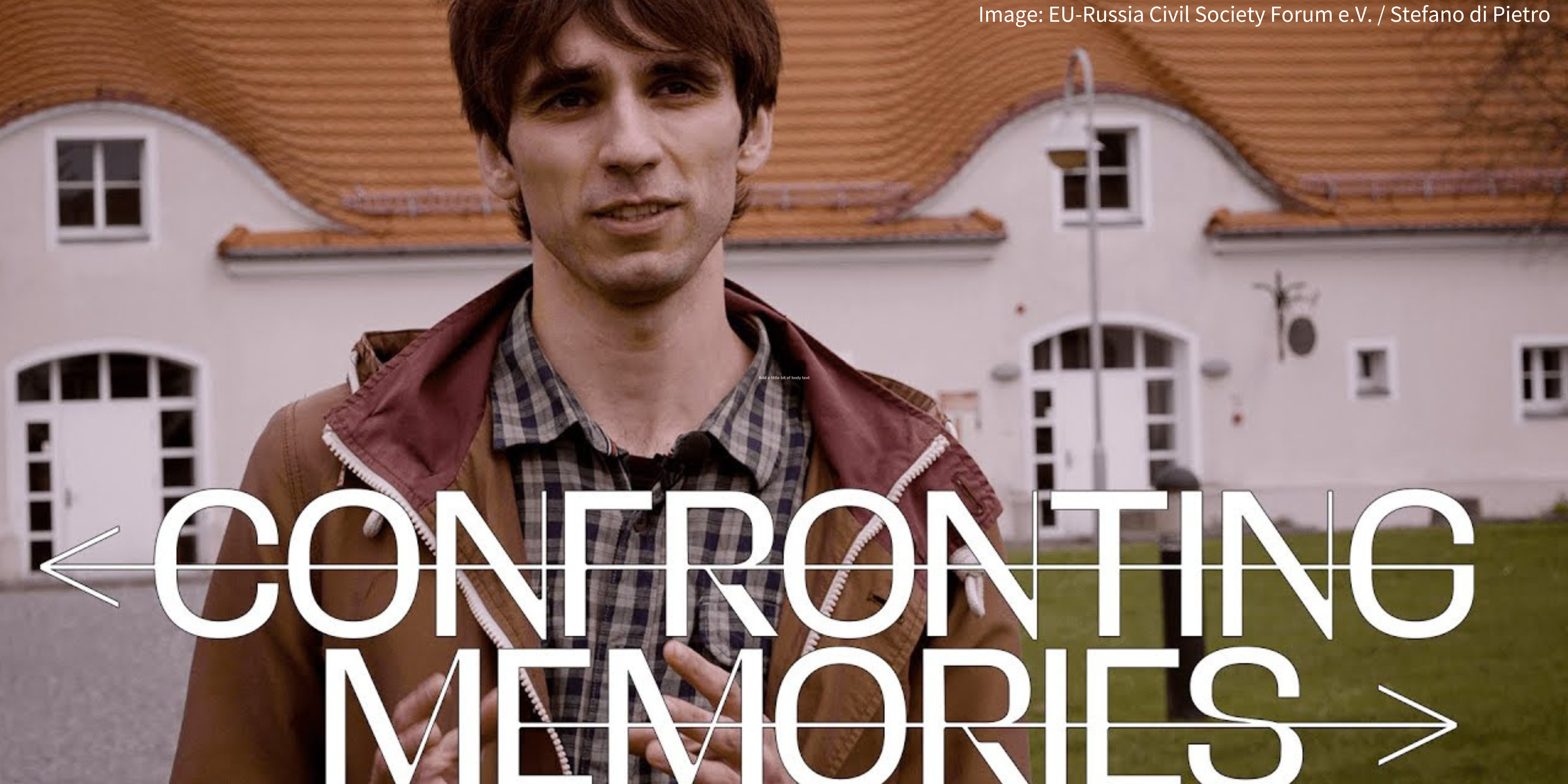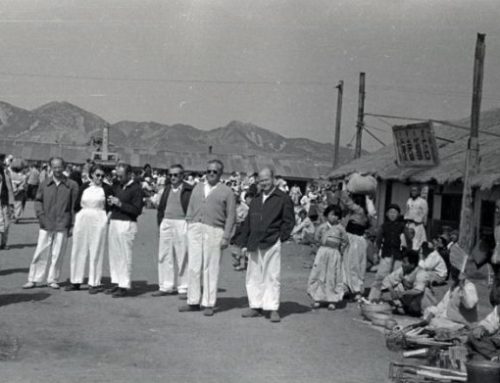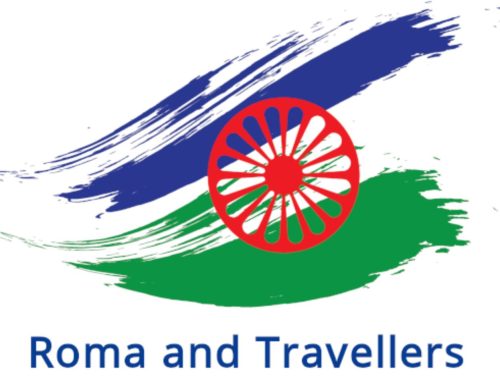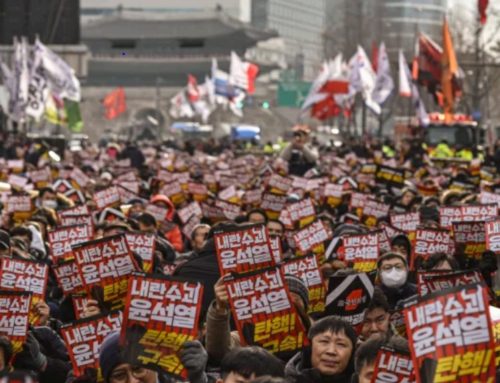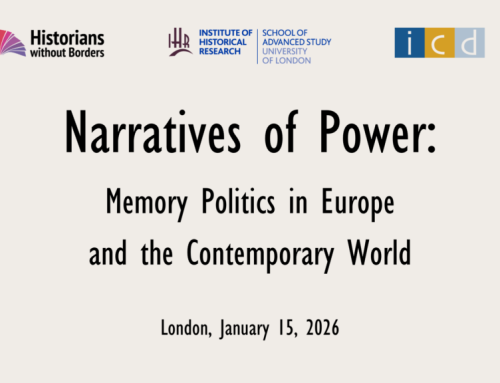Since the escalation of the war in Ukraine in February, a lot has changed for Taras Oleksyn, a history teacher and local historian from Lviv, Ukraine. History education will play a decisive role in a post-war Ukraine and how the country and its citizens deal with a difficult memory. Despite the upheaval experienced by everyone in Ukraine, Taras remains strong for his students, reminding them that they are important and that they have the chance for a good life when the war is over. In conversation with Marcus Chavasse and Kamila Łabno-Hajduk.
Marcus Chavasse, Kamila Łabno-Hajduk: At the start of the war and even now, Lviv has been a place of refuge for many people in central and eastern Ukraine. How has the city changed since 24 February?
Taras Oleksyn: Over the last few months up to now there have been big changes. The population of Lviv before the escalation of the war was around 1 million. According to official statistics, about 300,000 refugees came to our city, but we don’t know the actual number. Many decided to use Lviv as a kind of hub for migration to other countries. Some estimate that over 3 million people have come through Lviv, others more than 5 million.
Our part of Ukraine is more Ukrainian speaking than other parts in the East and the South, which have more Russian speakers, but now on the streets of Lviv we hear a lot more Russian. For locals, it’s become a kind of marker, showing that these people aren’t their ‘neighbours’, but rather people who have come here searching for safety. It’s a great honour for me that Ukrainians have shown that they are one big family. We come from different situations and backgrounds but in 2014, and now in 2022, we see that Ukranians use self-organisation and civic society to help one another. This escalation has become an important reason for Ukrainians to consider themselves one nation, without linguistic or religious conflict. People from completely different backgrounds are helping each other.
So you see a silver lining in this situation?
As a local historian, I see all these migrations as a positive thing for Ukraine. Of course, the war is terrible and we’ve lost thousands of people, but if we are talking about the future and about the potential of the country and its people, it’s great that those Ukrainians who had never been able to visit other regions have received the opportunity to do so; to see and understand how people from other regions live and what they believe in. There’s an ongoing summer camp where refugees and local children come together, go on excursions, have classes, etc. It’s wonderful to help these children understand each other better, as they are from completely different regions: some from Luhansk, others from Donetsk, Kherson, Crimea; others from totally Ukrainian territories but not far from the battlefields. It’s a chance for them to be more united.
It’s a good opportunity to get rid of the stereotypes of the so-called ‘pro-Ukrainian’ West and ‘pro-Russian’ East. As of right now, I think around 90% of Ukrainians think that Ukrainian should be the single official language of the country, even if they are Russian speaking. I know at least a few cases of Russians living in Ukraine who decided to learn our language because they wanted to show that they are not with Putin and that they support their new ‘motherland’ – Ukraine. In the case of Lviv, Ternopil, Ivano-Frankivsk, and even Kyiv and other cities that are in more or less ‘safe’ locations, we can see the beginnings of some societal transformations, and I hope that these transformations will show our people how strong and unified they can be.
Do you also see opportunities for education in Ukraine?
In Ukraine, and in other post-Soviet countries, we have a kind of ‘patriotic’ education. I don’t necessarily like this, but it is a way to show young people reasons they can love their country – not should, but can – through its nature and history. But now I’m happy that we have a new opportunity to show why we can be proud of our country and its people. It’s not about creating a new generation of soldiers who will defend their country; our new task is to help students understand why they should be active participants in society. They should be given the chance to show off their talents and be active in public life. We need to show them that if they do this, they will be able to create the country of their dreams.
We have a neighbour – or even two – who are showing what problems arise if people or nations are not proactive, but rather listen to their dictators and do everything they are told to. Now the role of Ukrainians and Ukraine is to show these countries another way of developing and creating a modern society. War is always terrible, but at the same time it’s like having a new apartment. When you move in, you can do anything you want, because there is nothing there. Many things have been destroyed: infrastructure, factories, roads, houses, cities, and so on – it’s the Russian style of war – but we have the chance to rebuild our country in a much better way.
Do you have new students in your classes that came from different regions of Ukraine? Do you use a different approach when teaching them?
We have some new students in our classes, but most of our students – at least the younger ones – have left to go to other countries. Because we have a good online connection and experience of Zoom teaching thanks to the pandemic, it was easier for their parents to make such a decision, but it’s a pity that so many left Ukraine. Even in ‘peaceful’ territories, we mostly have online lessons now. In general, most children of refugees are not going to school at the moment. They take part in online lessons with their old schools and teachers, for example, or their parents decided that these few months are not so important, or the war won’t go on for long enough for it to make sense to start a new school. And of course to maximise the safety of their children.
According to official statistics, more than 800,000 children are in other countries for now. The same goes for a lot of teachers: at least 25,000 teachers, mostly women, are abroad. It’s going to be a difficult period for us when we have to reorganise the educational system according to the new situation.
How do you talk about the war with your students?
In our talks and dialogues with students, we discuss the positive things this war and post-war period will bring. I’m trying to focus on these more positive things, and it’s very important for students, too, to understand that although they are living in a stressful period, they will have a good future if they stay strong. Almost all Ukrainians are living under stress right now. We have so-called ‘safe’ areas, but no one is in a totally safe zone. In Lviv, every evening there are missile attacks. When children are trying to understand why this is happening and what we are fighting for, we can say with certainty that it’s for a potentially brighter future.
In the secondary school where I work, the situation is different because we have a curriculum, and somewhere in between the set topics we have dialogues about the current situation. In my case however, and in the cases of all my colleagues, when children are worried about something, we talk about that, rather than the topics we ‘should’ be talking about. We’re trying to show the children that we are always with them; the curriculum is not as important as their lives and ideas. If we look at the situation now compared to 1 or 2 years ago, we’ve become much closer to our students. It’s nice that children want to talk about things that are important to them.
If teachers don’t talk to students and answer their questions, someone else will. And there is a risk that this will not have a good effect: Russia is using propaganda in its occupied territories. For example, a few days ago in Kherson, Mariupol and elsewhere, the Russian government decided to prolong the semester to teach students Russian language, literature and history. But almost all school directors and teachers decided against doing it, for ideological reasons first and foremost. I hope that Russian propaganda won’t ruin the brains and minds of our people in the occupied territories.
Are there any official resources that you can use to help you talk to the students or teach history?
Our Ministry of Education and some NGOs created a lot of online platforms to help students catch up and fill any gaps in their knowledge, and many students are using them. In schools, we’ve been preparing different books and texts about the current situation, as well as ‘life hacks’ for teachers to help them talk to students about the war and its problems. The psychological situation of students and their relatives is a big issue. Very often teachers are forced to become psychologists, which is why these life hacks are really important for us to help children to deal with these problems, or at least for teachers to be able to solve issues and be able to ask others for help.
How involved will teachers be in the creation of new materials in Ukraine
Our officials from the Ministry of Education are not as good as NGOs when it comes to creating new materials, so in this case, as in many others, teachers and volunteers took matters into their own hands and created their own resources. Fortunately we have a lot of online platforms that help teachers to access new materials or even complete lesson plans. These platforms are trying to get materials from teachers and share them with others. I saw a lot of new lessons, presentations, movies, etc. which are dedicated to teaching history. People have realised that there are too many pro-Russian narratives in our lesson plans, and that it would be better for the education system to create something new to show our past without such narratives.
In the meantime, it’s easier for teachers to do this work, and to explain to our students certain historical periods in relation to the war. Ukraine has had a lot of wars with Russia over the last 400 years or so. I noticed that when we were talking with our students about the Ukrainian Revolution of 1917-21, or the Cossack state in the 17th and 18th century, they stopped us and said “this looks like our current situation”. And it was true! If you read, for example, about the Ukrainian Revolution and the war with the Bolsheviks, you will see the same strategies from the Kremlin.
With this modern experience, our students have the brilliant opportunity to understand their ancestors from those periods, and to understand the decisions of people in the past, or the problems they faced. Our task as historians and teachers of history is to try to make this teaching more relevant and closer to the minds of our students, give them the possibility to understand that historia est magistra vitae, history is the teacher of life. I hope that we will all take this opportunity to create new materials which will help us to better understand our own history. One of the reasons that this war is taking place is the Russians’ incorrect understanding of their own history. If we don’t want to be like them and create a nation of aggressors, we need to do everything we can to deal with our own past, and make sure we learn our history in a good way. I hope that it will be a great experience for all of us.
You mentioned some parallels in Ukrainian history. I read some articles written by Polish historians who wrote that history can be helpful in explaining the current situation, do you agree?
This war helped Ukrainians – and I hope Poles, too – to better understand the relationship between our two nations. Ukrainians and Poles have had big problems at certain times in the past. The Kremlin decided to use these problems to its advantage: over the last few years, pro-Russian forces tried to create problems between Ukrainians and Polish historians, between societies. After this full escalation, Ukrainians have decided that we don’t need to focus on the negatives in our historical relationship. We have lots of good things that connect our nations. We have the same with Czech Republic, Slovakia, and the Baltic states. It’s great that even during a war, we can find ‘new-old’ friends. Maybe it will help other Europeans understand why they should be able to live together and help one another. It’s very important for historians of the future to make students understand that problems in the past do not force us to be enemies nowadays.
In Lviv, we have the Lychakiv cemetery from the 18th century. There are actually two military cemeteries there, one for Poles and the other for Ukrainians, who fought each other a hundred years ago. The cemeteries were destroyed by the Soviets, but were rebuilt in the late 90s or early 2000s by the Polish and Ukrainian governments. On the wall of this cemetery, there is a very nice quote: “We need to remember about our past, but we need to think about our future.” I think this quote is very relevant for the current situation with the war and historical education in our country and elsewhere.
At this point, it is worth mentioning two public figures: Jerzy Giedroyc, who was the editor of the Polish émigré monthly magazine “Kultura” founded in 1947, and Bohdan Osadczuk, an intellectual Ukrainian journalist living in Germany. They cooperated with each other for over half of a century: Osadczuk published many articles in “Kultura” and they both dreamed of dialogue, understanding and friendship between the Polish and Ukrainian people. Their dream is finally coming true as Volodymyr Zelenskyy said recently that Poles and Ukrainians have learned to appreciate and respect each other, and that the time that Giedroyć and Osadczuk dreamed of has come. I heard that Osadczuk is not well known in Ukraine because he was an emigrant, is this true?
Historians of course know about him, but history was not very popular among most of our people for many decades. Only a few years ago, when the Revolution of Dignity started followed by the first stage of the war in 2014 did people decide that maybe they would find answers to their questions in history books, but most of these questions were connected with Ukrainian-Russian ties, and Bohdan Osadczuk remained in the shadows in this situation.
One of our tasks as historians is to show new generations of Ukrainians that history can be cool and interesting. If young Ukrainians see history in this way, they might understand that if they can learn something from the past then it might influence the way they act in the present. By better understanding the problems of our past, maybe they will not make the same mistakes as older generations. The creation of new materials about historians such as Osadczuk is very important in the near future; our historiography needs to be renewed, too.
You’ve spoken a lot about the idea that Ukraine is re-calibrating, people are re-calibrating their ideas; it’s like you’re standing at an open door. At some point the war will finish and become a part of history. How do you think that the war is going to be taught in schools? Do you think that other aspects of history, such as WWII, will still be ‘cool’, or will this war be the main focus?
That’s an interesting question because just yesterday I read a Facebook post dedicated to this problem. It said that just after the end of the war, we will only have two ways to deal with its memory. One of them would be to create a variant of the phrase “never again” that we usually associate with WWII: to remember the war, but have it represent a small part of our history. We would create our own myth to forget about these horrible events and be able to move on with our lives. The other option, which would be much more prescient in our situation, is not to forget about this war or say phrases like “never again”, but to understand that with a neighbour like Russia, there will always be the risk of war; you could almost say that it’s our destiny to have wars with Russia. They think that Ukrainians, Belarusians and other Slavic nations are Russians. This is hard to explain to other Europeans because British people would never assume that the French are part of their nation, or Germans would never say that Italians are the same as them. We are also a separate nation with our own culture, language, and so on. It seems that Ukrainians will be forced to remember about this war in order to be ready for future escalations.
I don’t want to see victory in this war as something glorious, like Victory Day in Russia – we shouldn’t think like that. But our children and future generations should understand that this war is only a part of a total war between our nations; it’s an existential war for Ukrainians. That’s why how we should deal with this problem and how we should learn this part of history are very important questions. We need to prepare our future generations for potential aggression from our neighbours, but at the same time not make them aggressors themselves. I see it as a kind of ‘defensive history’.
We are at a crossroads when it comes to teaching history. Of course, we can’t have a totally pacific system because it could lead to weakness in the future, in terms of our integrity as a nation-state, but at the same time we can’t be too aggressive or nationalist in our teaching. Who knows, it could be a new experience for history teaching altogether. We’ll figure it out!
Taras Oleksyn is a local historian and history teacher at a secondary school and an out-of-school centre in Lviv, Ukraine. He co-authored a lesson plan dealing with border changes and forced deportations as a result of WWII as part of the Confronting Memories programme of the EU-Russia Civil Society Forum
Marcus Chavasse is a project manager at EU-Russia Civil Society Forum, working on the historical memory and education programme Confronting Memories and providing support to history teachers from across Europe in preparing multiperspective lesson materials on WWII.
Kamila Łabno-Hajduk is a historian and political scientist working at College of Eastern Europe in Poland. She cooperates with the EU-Russia Civil Society Forum on providing support to history teachers from across Europe.
Do you want to support history education in Ukraine at this crucial point? Make your donation to EuroClio’s own initative History for Peace ->

